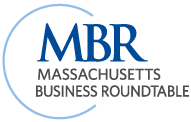Resources to Support Employee Caregivers
Looking for ways to support caregivers within your workplace? In honor of Family Caregivers Awareness month, the Roundtable hosted our November Open Forum in partnership with Associated Industries of Massachusetts (AIM) and the Massachusetts Caregiving Coalition to outline the state of caregiving among Massachusetts workers, its impact on our economy, and to hear from employers sharing resources and best practices to support their employees with caregiving roles including elder care, child care, and other loved ones.
The Roundtable hears from members about their focus on supporting employee well-being and we encourage employers to explore the various resources and strategies available to support employees with caregiving responsibilities. To that end, we have summarized the top takeaways and resources shared at our November Open Forum below. Employers can also join the Massachusetts Caregiver Coalition, which the Roundtable helped to launch in 2019.
Top Takeaways
- A significant portion of our workforce has caregiving responsibilities for children, elder parents, and other loved ones, and the number has increased dramatically since the pandemic.
- Massachusetts is fortunate to have many resources available to support workers with caregiving responsibilities and employers play an important role in highlighting these benefits and providing additional supports for their employees. Several of the resources shared are outlined below. Additionally, the Massachusetts Caregiver Coalition is another platform to support employees to access best practices and build support for caregivers.
- While there are many benefits and business practices recommended to support employee caregivers, creating a supportive culture that is responsive to the needs of an employees’ overall well-being is essential.
The State of Caregiving in Massachusetts: We were joined by leaders from the Caregiving Coalition, the Massachusetts Executive Office of Elder Affairs, and ARCHANGELS, who shared data and resources about the state of caregiving in Massachusetts and its implications for our workforce and economy.
- Ben Linville-Engler, Chief Investment Strategist and Program Executive at MassTech, home to the Massachusetts Caregiving Coalition, framed the discussion by providing data about the economic impact of caregiving. Data shows that caregiving needs grew during the pandemic while available services dropped, leading to a redistribution of caregiving work in the workforce. In Massachusetts, the number of informal caregivers rose from 844,000 in 2017 to 1.1 million in 2022. There is also an economic impact to the rise in informal caregivers. MassTech offers a Caregiving Initiative which includes the Massachusetts Caregiver Coalition, a network of employers to support employee caregivers across employer sizes, locations and type.
- Robin Lipson from the Massachusetts Executive Office of Elder Affairs explained that the pandemic has closed many programs and facilities, such as nursing homes and day programs, which has caused people to relocate or move back with family. She outlined several Massachusetts resources available for caregivers and their families and loved ones. The Family Caregiver Support Program can help people navigate the program supports and resources available on a range of issues, including family dynamics, finances, access to programs, and more. The Massachusetts Office of Elder Affairs is also offering monthly webinars on topics such as managing family relationships. Links to upcoming webinars is available below. Employers can also distribute these resources with their employees.
- Alex Drane from ARCHANGELS outlined the ARCHANGELS’ Caregiver Intensity Index, a resource that assesses the impact of unpaid caregiving on well-being and connects caregivers to the supports available. She shared data around those who are at highest risk for mental health impacts and explained that caregivers whose employers have caregiver support groups have lower intensity scores.
Best Practices from Employers: AIM and Roundtable members at Seniorlink, Dependable Cleaners, and other companies shared how they approach support for employee caregivers. The strategies and best practices include:
- Conducting employee surveys to check in
- Authentic communication from leadership on their own personal challenges
- Encouraging empathy in the workplace and providing benefits for overall well-being
- Free access to apps such as Ginger and Calm
- Employers highlighted high adoption rates for these apps
- Hosting meditation and other wellness programming
- Flexible schedules for employees, even when it impacts business operations
- Reviewing promotion data to ensure equity across workforce
- Monitoring impact of remote work on workers with caregiving responsibilities
- Access to other programming around financial planning, retirement, and other topics
- Most importantly, employers underscored the need to create a supportive culture that recognizes an employees’ overall well-being
Key Resources: Massachusetts is fortunate to have many resources available to support caregivers. Learn more about resources available for employers and caregivers.
- Massachusetts Caregiver Coalition: https://macaregivercoalition.org/
- Join and connect with a network of employers to share best practices and encourage support across sectors
- Report: The Cost of Caregiving to Massachusetts Employers: https://macaregivercoalition.org/sites/default/files/2022-11/MeHI%202022%20report%20CHI.pdf
- ARCHANGELS Caregiver Intensity Score: https://archangelscii.me/mbr-cii
- Access your intensity score and share with employees
- Family Caregiver Support Program: https://www.mass.gov/family-caregiver-support-program
- Caregivers can connect with a specialist to learn about resources and supports for themselves
- MassOptions: https://www.massoptions.org/massoptions/ or call 800-243-4636
- Call MassOptions to ask for your local family caregiver support program to get contact information for local programs for your loved ones
- Upcoming Executive Officer of Elder Affairs webinars:
- November – family caregivers and communication other family members: https://us02web.zoom.us/webinar/register/WN_8IH1K7h9QhC4hSQdzvJg7A
- December – Family communicating with loved ones: https://us02web.zoom.us/webinar/register/WN_0yCmemK-QHadJUfWdsH76w
RECENT POSTS
- Quarterly Policy Roundup: Q1 2024
- Black History Month: Reflections from Roundtable Staff
- Roundtable Members Discuss Impact of Business on Society
- Quarterly Policy Roundup: Q3 2023
- What We Heard This Summer in Our Roundtable Member Meetings
- Health Equity in Massachusetts and Why it Matters
- Growing MA’s Labor Market: Why Immigrants Should be Part of the Solution
- Massachusetts’ Future of Energy
- Roundtable Members Share Reflections on Workforce Dynamics
- Quarterly Policy Roundup: Q1 2023
